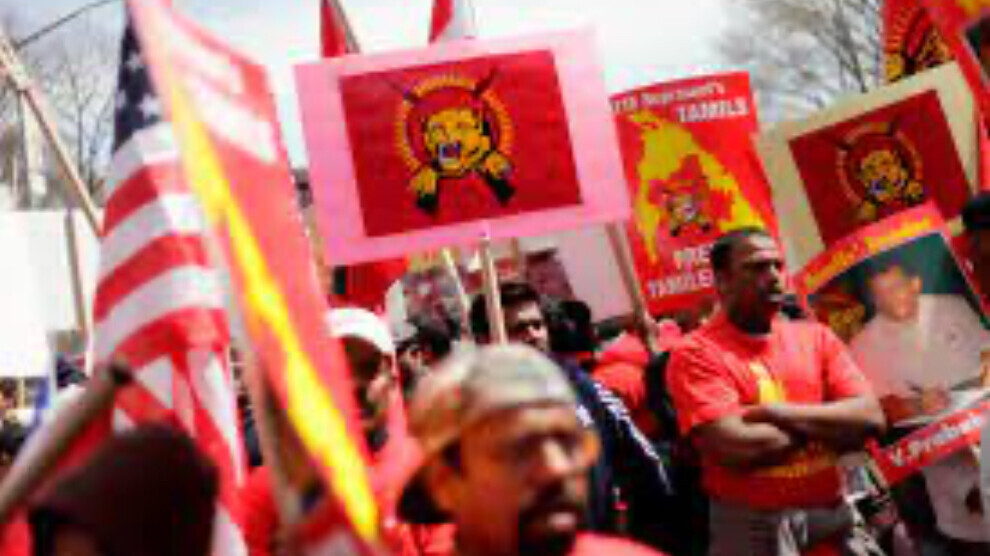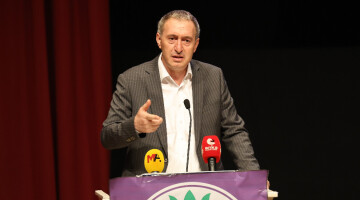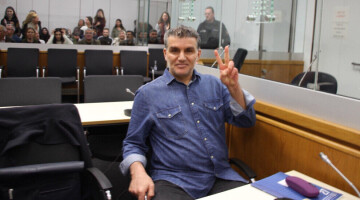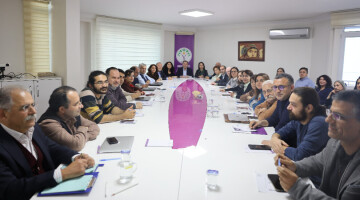Tamil activist Agilan Varatharajah underlined that when the "Sri Lanka model" is mentioned, what’s offered is a genocide attempt. “The discussions over the Sri Lanka model show that a genocide against the Kurdish people is also on the agenda. The Sri Lankan experience demonstrated that if a guerrilla movement is massacred, ordinary people would also be massacred,” Varatharajah said.
The Sri Lankan state forces committed genocide against the Tamil people and guerrillas between 2008-2009. When the Sri Lankan government announced on May 18, 2009 that it was ending the war, more than 70,000 people were massacred in the Tamil country. All the commanders and fighters of the Liberation Tigers of Tamil Eelam (LTTE), including its leader Probhakaran, were killed. After the elimination of the Tamil Tigers, the Sri Lankan state which occupied the Tamil country launched a campaign of torture, rape and executions. Declaring ‘victory’ after the genocide, the Sri Lankan government forced the Tamil people to celebrate by displaying state flags in their homes. Furthermore, the regime sought to destroy the legacy of the guerrilla movement by constructing police stations in the places where the LTTE cemeteries are located.
TURKEY TOOK INSPIRATION
Inspired by the elimination of the liberation struggle of the Tamil people, Turkish state officials have also named the plan to eliminate the Kurdish Freedom Movement as the ‘Sri Lanka model’ since the early 2010s. The ‘Collapse Plan’ which was almost similar to the ‘Burying-Wiping Plan’ implemented by the Sri Lankan army in 2009 was announced after the October 2014 meeting of the Turkish National Security Council (MGK) and implemented in 2015.
SRI LANKA MODEL IS A GENOCIDE MODEL
Tamil activists, who are currently carrying out the freedom struggle of the Tamil people in exile, pointed out that there are serious similarities between the war concepts of the Turkish and Sri Lankan regimes. Varatharajah, a Tamil activist living in Germany, agreed that there were similarities and thus called on the Kurdish people to take it seriously. “The Sri Lanka model means genocide. Discussing the Sri Lanka model is to bring the genocide of the Kurdish people up to the agenda. Because the Sri Lankan experience demonstrated that if a guerrilla movement is massacred, ordinary people would also be massacred,” the Tamil activist said.
NO GUERILLA, NO RESISTANCE
Varatharajah emphasized that there is no solution but to fight fascism. “Because in our case, you see what comes next. If a guerrilla movement is destroyed, you have to be careful about what comes next. What is coming is nothing but a very dangerous process for society. After the guerrilla movement was destroyed in the Tamil country, there was no resistance left.” Varatharajah remarked that violence against women increased after the elimination of freedom fighters in their country. “You can't do anything anymore. Moreover, genocide targets the culture as well,” he noted.
THEY ALSO USED CHEMICAL WEAPONS
Tamil female activist Laksi pointed to what happened during the genocide against her country. “They carried out intense bombing attacks and used chemical weapons. They threatened other sections of society and attacked civilian areas. Civilians were forced to migrate.”
AFTER MASSACRE, SRI LANKA'S PRESIDENT CALLED TURKEY
Laksi revealed that one of the first foreign leaders that Sri Lankan President Mahinda Rajapaksa spoke on the phone when he declared his victory over the Tamil people on May 18, 2009, was then Turkish President Abdullah Gül. “They tried to export the war against the Tamils as a war against the Kurds.”
KURDISH WOMEN'S MOVEMENT IS STRONG
Laksi noted that after the war, femicides have increased in Sri Lanka, similar to femicides in Kurdistan. “Likewise, there is a huge number of femicides in Turkey. However, the Kurdish women's movement has carried out a major struggle against the policy of femicide in their fight against the practices of the Turkish state,” she added.












